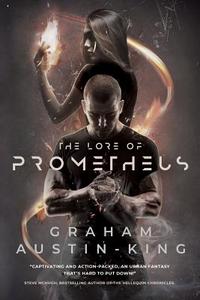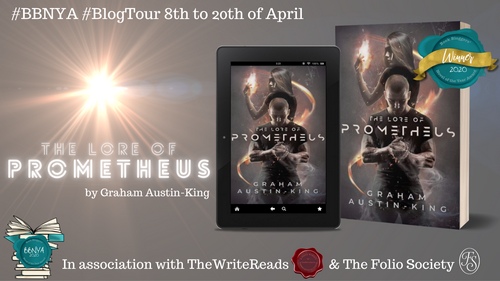 |
The Lore of PrometheusKindle Edition, 287 pg. Read: April 9-12, 2021 |

What’s The Lore of Prometheus About?
Not that long ago John Carver was in Kabul as part of a Special Reconnaissance Regiment squad. As is too often is the case, a mission went awry and Carver watched his comrades die in front of him—he alone survived due to circumstances he could not explain.
As the book opens, he’s in London and isn’t dealing with his PTSD in any constructive or healthy way. Again, as is too often the case, he’s trying to numb himself with alcohol, gambling, and other self-destructive acts. Like taking out a significant short-term loan from a loan shark. The loan needs to be repaid soon, and there’s no way that Carver can do that.
He may be self-destructive, but there are limits. So he cashes in a favor and gets a job for a private security firm. His first assignment is to return to Kabul and train a government official’s security team. The last place he wants to go is where he’s known as “The Miracle of Kabul.” But it’s that or meeting a very painful end in London.
Carver doesn’t want to think of the incident—and will put in the effort to distance himself from it. But there’s a group more determined to find out exactly what happened. They’re well-funded, organized, and single-minded. They want to be able to explain people like Carver and the abilities they seem to have—and will take extreme measures to find that explanation and hopefully replicate those abilities.
Reality Check
The early chapters have Carver in London and then in Kabul. Those chapters have a gritty realism that I’m not used to in Urban Fantasy. In terms of setting, atmosphere, and characters—it’s like they stepped off the pages of a top-notch military thriller. More than once I had to ask myself, “We’re getting to the fantasy elements, right? Did I forget the blurb—this is fantasy, isn’t it?”
And sure, at a certain point, there’s no question—this is a Fantasy novel. But up until that right turn into Fantasy, Austin-King could’ve turned left and given us a perfectly serviceable (possibly very good) thriller full of true-to-life details.
You don’t see that very often and I wish I did.
Embracing the Ambiguity
I took several Creative Writing courses and workshops in college, in the decades since I’ve forgotten almost everything that my instructors or fellow students said about my workshopped pieces. But some of those comments I’ll carry until I’ve run down the curtain and joined the choir invisible. One of those concerned a supernatural event in one of my stories, a student (who was 50x the writer I was) argued that I should leave it ambiguous as to what happened, let the audience decide what the nature of the event was—it would be more effective. I saw his point about that scene, but the story hinged on that being a supernatural event—the rest was meaningless if that scene had a naturalistic explanation.
That came to mind as I was thinking about part of what Carver experiences. To keep it as vague as possible, we know that he can do certain things and that other characters can do other inexplicable things. But there are some things that could be an expression of his PTSD or could be paranormal in origin. It is far more effective, like the man in my workshop would say, that we don’t know what’s going on there. The scenes in question are very different depending on how you interpret those experiences. And I’ve enjoyed debating the interpretation with myself, I imagine I’m not alone.
Along those same lines, there are a couple of explanations given for the rest of what Carver (and just about everyone else) experiences—magic or “fringe” science thing worthy of Walter Bishop (and the door is open to other explanations, too, I think). Not only does Austin-King not give us an answer, he really doesn’t even explore the idea, debate the issue, or anything. It’s almost as if the text doesn’t care—it certainly doesn’t matter for what we need to know. That’s the way to do it.
I’m certainly not saying that McGuire, Hearne, Butcher et. al are wrong to say “magic” or that those like Jackson Ford who have a more science-y take on it are making a misstep—like me, their stories depend on a certain take on the idea. The Lore of Prometheus on the other hand shines in the lack of certainty.
Why I Almost DNFed This
There was a significant portion of this book that focused on people other than Carver and those in his immediate sphere of influence.
The theory embraced by those who are trying to understand his abilities is that those abilities are first and most easily manifested at emotional extremes, at the point of exhaustion where the subject’s mental barriers are most likely at their weakest. We’ve all seen things like this in various guises. To get the subjects to that point, they’re isolated, caged, only given the barest essential food and drink—essentially tortured.
And there’s a lot of that depicted. And not only did I not enjoy those portions of the novel, they just about drove me to stop reading. If I’d bought the book or checked it out of the library, I probably would have. But I’d agreed to this post, and that only comes through reading the book.
The first several chapters were fine, the last few chapters were better than fine. But I’m just not sure about that large middle section. Act II, if you will*. Was Act III worth working through that? I’ve had at least five answers to that in mind as I wrote this post. I think I’m going to leave the question unanswered. Some readers will think Act III pays off well enough to justify the second act. Others will absolutely disagree. Others will think I’m over-reacting and Act II isn’t that bad.
* I’m not entirely certain that this fits the three-act structure, but let’s use that for the sake of argument, okay?
As for me? It surely might have been worth pushing through. But I just don’t know.
So, what did I think about The Lore of Prometheus?
Well, I’m just not sure.
Can I see where a lot of people would like the novel and Austin-King’s writing? Absolutely. I’ve talked about some of the reasons for that above. Can I see where people wouldn’t enjoy the novel? Absolutely. But I’ve spent most of a week trying to decide what I think of the novel and I’m not sure. I’m probably going to spend a few more days wrestling with that. Maybe the fact that I’m spending this much time on the question rather than just shrugging it off and moving on says more than a definitive answer reached immediately after finishing.
It’s an interesting premise, well-executed, with compelling characters, gripping action, and a very satisfying ending. I’m sure of that. I’m confident most readers will see that. I’m just not sure what I think about the novel as a whole. If you find this intriguing, you should give it a chance.
 I received this book from the BBNYA tours organized by the @The_WriteReads tours team, and thank them for the opportunity. As always, all opinions are my own.
I received this book from the BBNYA tours organized by the @The_WriteReads tours team, and thank them for the opportunity. As always, all opinions are my own.
BBNYA is a yearly competition where book bloggers from all over the world read and score books written by indie authors.
If you are an author and wish to learn more about the 2021 BBNYA competition, you can visit the official website (https://www.bbnya.com/) or our Twitter account, @BBNYA_Official. If you would like to sign-up and enter your book, you can find the BBNYA 2021 AUTHOR SIGN UP FORM HERE. Please make sure to carefully read our terms and conditions before entering.
If you are a book blogger or reviewer, you can apply to be part of BBNYA 2021 by filling out this form (also remember to read the terms and conditions before signing up)!
BBNYA is brought to you in association with the Folio Society (If you love beautiful books you NEED to check out their website!) And the book blogger support group TheWriteReads.






1 Pingback